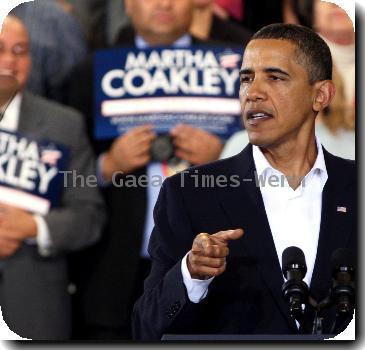Bad US housing data weigh on world markets as investors eye Fed policy statement, Obama speech
By Pan Pylas, APWednesday, January 27, 2010
Bad US housing data hits world markets
LONDON — World stock markets fell Wednesday after another poor set of U.S. housing data hit investors who were already on guard ahead of the latest statement from the U.S. Federal Reserve and President Barack Obama’s first State of the Union address.
The FTSE 100 index of leading British shares was down 69.91 points, or 1.2 percent, at 5,212.94 while Germany’s DAX fell 39.37 points, or 0.7 percent, at 5,629.56. The CAC-40 in France fell 51.64 points, or 1.4 percent, to 3,755.40.
On Wall Street, the Dow Jones industrial average was down 40.81 points, or 0.4 percent, at 10,153.48 about an hour into the session while the broader Standard & Poor’s 500 index fell 3.85 points, or 0.4 percent, at 1,088.32.
Sentiment, already weighed down by ongoing concerns about further lending curbs in China ahead of the latest interest rate decision from the Fed, was hit by the news that the sale of new homes in the U.S. unexpectedly fell in December.
The Commerce Department said sales of new homes fell 7.6 percent in December to a seasonally adjusted annual rate of 342,000 from an upwardly revised 370,000 in November. The consensus in the markets was for a modest increase from the previously reported November figure of 355,000.
The figures further stoked concerns in the market that the recovery in the U.S. will be a slow and laborious affair especially as the slumping housing market proved to be the catalyst to the banking crisis and the deepest global recession in generations.
“December’s figures add to recent evidence that the recovery in the housing market will falter once the fiscal support is removed,” said Paul Dales, U.S. economist at Capital Economics.
Investors were already in a wary mood as they geared up for the latest Fed statement.
Though the Federal Open Market Committee is expected to keep its benchmark interest rate unchanged at a range of zero to 0.25 percent, investors will be more interested in the accompanying statement and in particular whether there’s continued support for keeping borrowing costs “exceptionally low and for an extended period.”
Most think there will be few changes in the Fed’s rhetoric Wednesday but that policy changes could come soon.
“Unsettled markets and subdued inflation expectations do not warrant a change in the stance today but the Fed is close to completing its credit-easing program,” said Neil Mackinnon, global macro strategist at VTB Capital.
Investors will also be keeping a close eye on President Barack Obama’s first State of the Union address later to see if he sharpens his attacks on the banks.
“President Barack Obama is under scrutiny from all sides at the moment, and his State of the Union address really is the hot ticket tonight — not just stateside but globally,” said Tim Hughes, head of sales trading at IG Index.
“More tough yet ambiguous rhetoric on the subject of bank regulation could see the hangover for investors continue at least another day yet but a firm but reassuring tone, however, could see the markets bounce back,” he added.
Stocks around the world have been in retreat for most of the last week in the wake of Obama’s announcement that he plans to impose restrictions on banks more risky trading activities as well as mounting speculation that China is looking to rein in bank lending to prevent a nasty inflationary spike.
Investors are getting increasingly vexed over possible policy changes in China, as the country’s growth helped limit the impact of the global recession over the last year — figures last week showed that China’s economy grew an eye-catching 10.7 percent in the final three months of the year from the year before.
The worry is that tighter monetary policy in China to check inflationary pressures could kill off the limited economic recovery around the world — figures Tuesday from Britain and South Korea showed exactly how fragile the recovery is.
Those worries weighed on Asian markets earlier, with Shanghai’s main index closing 1.1 percent lower at 2,986.61.
Japan’s Nikkei 225 stock average fell 73.20 points, or 0.7 percent, to 10,252.08, with the broader market hurt by heavy selling in Toyota shares. The world’s No. 1 car company halted U.S. sales of eight models to fix a potentially dangerous gas pedal problem. Its shares tumbled 4.3 percent.
Elsewhere, South Korea’s Kospi declined 0.7 percent to 1,625.48 while Australia’s benchmark slid 1.6 percent and Taiwan’s market fell 0.5 percent.
Hong Kong had bucked the broader selling for a while before capitulating, and the Hang Seng index ended 0.4 percent lower at 20,033.07.
Oil prices were relatively flat with benchmark crude for March delivery up 5 cents at $74.76 a barrel in electronic trading on the New York Mercantile Exchange. The contract fell 55 cents to settle at $74.71 on Tuesday.
The dollar fell 0.4 percent to 89.25 yen while the euro was down 0.2 percent at $1.4053.
____
AP Business Writer Jeremiah Marquez in Hong Kong contributed to this report.
Tags: 2010 State Of The Union Address, Asia, Barack Obama, China, Construction Sector Performance, East Asia, Europe, Events, Executive Branch, Greater China, Hong Kong, London, North America, Prices, Real Estate, Recessions And Depressions, State Of The Union Address, Union, United Kingdom, United States, Western Europe, World-markets

